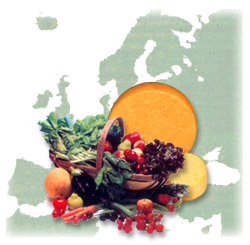There is actually no single Mediterranean diet.Because the Mediterranean Sea is bordered by at least 16 countries, there is actually no single Mediterranean diet. The diet is not exactly the same in any of these countries or even between regions within a country. Of course the reasons for the differences have to do with differences in culture, ethnic background, religion, economy and agricultural production.

There are, however, some common characteristics among the diets of people surrounding the Mediterranean Sea.
- high consumption of fruits, vegetables, bread and other cereals, potatoes, beans, nuts and seeds
- olive oil is an important monounsaturated fat source
- dairy products, fish and poultry are consumed in low to moderate amounts, and little red meat is eaten
- eggs are consumed zero to four times a week
- wine is consumed in low to moderate amounts
The traditional diets from the people living in the 1960's in countries like Greece, and Southern Italy have been studied extensively over the past several years.
The Mediterranean diet is not very close to the American or Canadian 'average' diet but is close in some respects to the American Heart Association dietary recommendations.
The studies were done due to the notably low incidence of chronic diseases and high life-expectancy rates of the Mediterrranean people eating traditional Mediterranean diet foods.
The Mediterranean diet delivers as much as 40% of total daily calories from fat, yet the associated incidence of cardiovascular diseases is much less than in America. Olive oil, which is commonly used in the area of the Mediterranean, does not have the same cholesterol-raising effect of the saturated fats used in North America. Olive oil is also a good source of antioxidants. Eating fish a few times per week benefits the Mediterranean people by increasing the amount of "Omega-3 fatty acids" - something that the rest of us don't get enough of.
People who follow the average Mediterranean diet eat less saturated fat than those who eat the average American diet. In fact, saturated fat consumption is well within our dietary guidelines.
The incidence of heart disease in Mediterranean countries is lower than in the United States. Death rates are lower, too. But this may not be entirely due to the diet. Lifestyle factors (such as more physical activity and extended social support systems) may also play a part.
Eating red meat sparingly is also a characteristic of the Mediterranean area and seems to also increase health.There is a general consensus among health professionals that this way of eating is healthier than the North European and American diet because more grains, such as spaghetti, fruits, vegetables, legumes, nuts, and olive oil are consumed.
My favorite aspect of the Mediterranean diet is that red wine is acceptable and even recommended... now I don't feel guilty about enjoying a glass with my dinner.
Eat, drink & be thin on the Mediterranean Diet!

Read more about the health benefits of wine
Return to Personal Trainer Blog
Inspirations Personal Training Home Page:
Let Cindy be Your Personal Trainer




